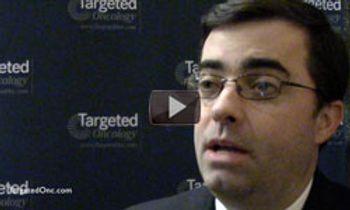
Adding celecoxib and zoledronic acid to standard treatment extended survival in men with metastatic prostate cancer commencing first-line hormone therapy, according to updated data from the STAMPEDE trial.

Your AI-Trained Oncology Knowledge Connection!


Adding celecoxib and zoledronic acid to standard treatment extended survival in men with metastatic prostate cancer commencing first-line hormone therapy, according to updated data from the STAMPEDE trial.

The addition of the CTLA-4 inhibitor ipilimumab to cisplatin and gemcitabine failed to significantly improve the primary endpoint of overall survival (OS) in a phase II study for patients with metastatic urothelial cancer.

The investigational anti-PD-L1 antibody avelumab showed antitumor activity within acceptable safety profile parameters in a recent phase Ib trial for metastatic urothelial cancer refractory to standard therapy.

Hypofractionated radiotherapy and standard radiation therapy demonstrated similar toxicities and neither prevented PSA increases or disease recurrences for men with intermediate-risk prostate cancer better than the other, according to data from the phase III randomized CHHiP trial reported at the 2016 GU Cancers Symposium.

Second-line treatment with atezolizumab (MPDL3280A) resulted in a median overall survival (OS) of 11.4 months in patients with locally advanced or metastatic urothelial carcinoma (mUC) and who showcased high PD-L1 levels.

A post hoc analysis of the phase III COU-AA-302 clinical trial suggests docetaxel can produce antitumor activity as the first subsequent therapy following disease progression with abiraterone acetate in men with chemotherapy-naive, metastatic castration-resistant prostate cancer.

Sartor says the test would lay out molecular data regarding a patient's malignancy and allow community oncologists to determine what would be the best course of treatment. He added that the hope for this study is to replace the "trial and error" method of treatment with something more concrete.

Agarwal says patients whose penile cancer does not spread to their lymph nodes have a 95% chance of survival over the course of 5 years, while survival for those whose cancer spreads to their lymph nodes is significantly less.

Emberton says that in treatment of most solid tumor cancers, oncologists have moved from treating the whole organ to specifically targeting the tumor.

Aspirin, normally associated with heart health, may not extend to the reduction of risk in prostate cancer, according to the results of an observational study.

Resistance to androgen receptor therapies in patients with metastatic castration-resistant prostate cancer (mCRPC) has historically posed a challenge to clinicians. Now, a new blood test that analyzes circulating tumor cells (CTCs) could help overcoming these hurdles.

In a comparison study, cabozantinib significantly boosted progression-free survival (PFS) against everolimus in patients with renal cell carcinoma (RCC) regardless of metastases degree, type, number of prior treatments, or patient risk status.

Androgen deprivation therapy (ADT) with or without chemotherapy led to similar survival in men with advanced, metastatic hormone-sensitive prostate cancer, according to an updated analysis of a randomized trial.

Scott T. Tagawa, MD, MS, associate professor, Clinical Medicine and Urology, Weill Cornell Medical College, discusses PSMA-targeting agents for the treatment of prostate cancer.

An immune checkpoint inhibitor combined with active immunotherapy has a potential positive effect on overall survival (OS) in the treatment of metastatic castration-resistant prostate cancer (mCRPC).

The antiangiogenic agent pazopanib combined with paclitaxel showed significant antitumor activity in a phase II study of patients with relapsed/refractory urothelial cancer.

MPDL3280A, an investigational antibody that targets programmed death-ligand 1 (PD-L1), in combination with bevacizumab had strong antitumor activity and induced responses in 4 of 10 patients with mRCC.

Bishoy Faltas, MD, clinical fellow, Weill Cornell Medical College, discusses clonal heterogeneity in platinum-resistant metastatic urothelial cancer.

Martin H. Voss, MD, medical oncologist, Memorial Sloan Kettering Cancer Center, discusses the phase I/II DART study.

The risk of dying from prostate cancer increased fourfold when active surveillance was used to monitor men with intermediate-risk disease compared with low-risk prostate cancer patients, according to results of a new study, the first to examine long-term outcomes of patients with low- versus intermediate-risk prostate cancer who have been managed with this conservative approach to care.

Neither sorafenib nor sunitinib improved outcomes when administered after surgery to patients with locally advanced renal cell carcinoma (RCC), according to results from the phase III ASSURE trial. These results were presented at a presscast held ahead of the 2015 Genitourinary Cancers Symposium.

David F. McDermott, MD, associate professor, Department of Medicine, Harvard Medical School/Dana-Farber Cancer Institute, discusses PD-L1 expression in kidney cancer and developing biomarkers for anti-PD-L1 agents.

According to a retrospective analysis of the phase III COMPARZ trial, high tumor expression of the protein PD-L1 (programmed cell death 1 ligand 1) is independently associated with shorter overall survival (OS) in patients with metastatic renal cell carcinoma (mRCC) receiving treatment with vascular endothelial growth factor (VEGF)-targeted therapy.

Elizabeth Plimack, MD, MS, attending physician, medical oncology, Fox Chase Cancer Center, discusses a phase I trial looking at overcoming mTOR resistance in renal cell carcinoma (RCC).

Most medical oncologists in the United States would opt for an mTOR (mammalian target of rapamycin) inhibitor as second-line therapy for patients with metastatic clear cell renal cell carcinoma (mccRCC).

Investigators reported at the 2014 Genitourinary Cancers Symposium that two new combinations demonstrated activity in refractory or advanced, previously untreated urothelial carcinoma in phase II evaluations.

Survival, measured as either disease-specific survival or relative conditional survival, has not improved for patients with metastatic urothelial carcinoma despite increasing use of second-line therapies with no formal indication in this setting.

A meta-analysis presented during the 10th Annual Genitourinary Cancers Symposium found that when used with other therapies for the treatment of mCRPC, prednisone does not raise the risk for severe toxicities, nor does it affect overall survival (OS).

William K. Oh, MD, professor of medicine, hematology and medical oncology, urology, The Mount Sinai Hospital, discusses a biomarker development trial of satraplatin in patients with metastatic castrate-resistant prostate cancer.

Patients with bone metastatic castration-resistant prostate cancer (CRPC) who received radium-223 dichloride (Xofigo) continued to have a low incidence of myelosuppression and no associated secondary malignancies at a 1.5-year follow-up of the pivotal phase III ALSYMPCA study that was presented at the 2014 Genitourinary Cancers Symposium.